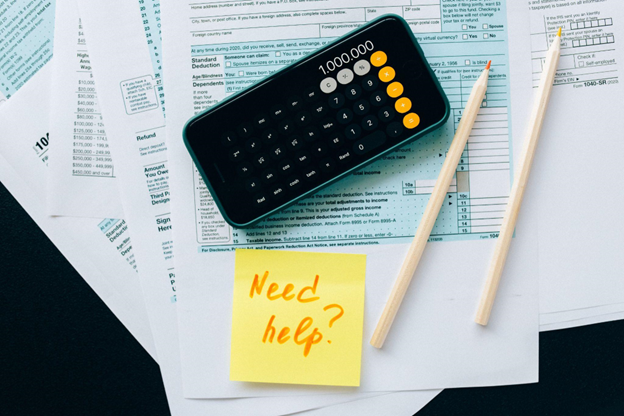Credit Tip Tuesday #63 Steps To Take Now For An Easier Next Year's Tax Filing

April is the official tax season in Canada, which means there’s only a little time left to prepare, submit, and properly file your taxes.
However, due to the complexity of the documents and the pressure of the process itself, most Canadians prefer to hire an expert to do their taxes. The reasons are:
- Not knowing how the tax filing works
- Intimidated by the documents, cheques, slips, etc.
- Fearing the penalties in case of late or wrong tax filing
What should be an easy task seems like a never-ending journey resulting in so much agitation in Canadians throughout the tax filing month. Not anymore!
We’ve curated all the simple steps you need to take to avoid being anxious in the next tax-filing season. Let’s get started!
Tax-Filing: Easier Than You Can Imagine!
You can file your taxes until April 2022 (or May 2) for the 2022 tax season. And, if it’s your first time filing taxes, your anxiety must be all over the place.
But paying taxes on time is essential, especially if you owe to the government, because not doing so can result in serious penalties. So, here’s what to do for easy tax filing:
1. Gather, Organize, & Digitize!
Image Credits: Unsplash
The initial step for first-timers or experienced Canadians is to gather all their tax-related documents.
Your personal details, income slips, aid cheques, or anything you might need for tax-filing must gather everything by the end of January.
- Early preparation can save you from late tax-filing
- All the documents in one place will give you the satisfaction that you have what you need
After gathering all the documents for your tax-prep checklist, you must organize them depending on their ‘requirement’ status.
Whether you choose to file your taxes yourself or hire an accountant, you’ll need the documents to fill out the form or send them to a professional. So, it’s only wise to keep everything ready beforehand.
However, if you choose to file taxes online or send the documents via email or web, you must digitize them first!
Use a document digitization app or an online scanner tool to scan your documents.
2. Learn About Your Tax BracketsThe Canadian tax system decides an individual tax rate as their income falls in a specific tax bracket. And, as the income increases, so does the tax rate.
In simple words, a tax bracket is basically a range referring to your income tax rate.
So, finding and understanding your tax bracket is significant for accurate tax filing in Canada. According to Canada’s official website, five tax brackets work as:
|
Tax Brackets |
Income Tax Rate |
|
$49,020 or above |
15% |
|
$49,020-$98,040 |
20.5% |
|
$98,040-$151,978 |
26% |
|
$151,978-$216,511 |
29% |
|
Above $216,511 |
33% |
You can find your tax rate from the above mentioned tax brackets. However, decide the bracket depending on your total income (without taxes) from all earning sources.
Also, ensure that you haven’t included any tax deductions you can claim in the future.
Note: The percentage rate and income ranges might change yearly as per the tax-payer rules and laws. So, visit the official website to find your tax rate next year.
3. Know Your Claims!
Image Credits: Freepik
Depending on your income, status, and individuality, you might be eligible for certain credit deductions.
The claim can help you lower the total tax amount. There are two ways to do that:
- Deductions: You can minus these deductions directly from your income before calculating the total tax amount. However, the options might be less for individuals as compared to businesses. Some of the deductions you can claim are supporting spouse or children bills (divorce, separation), work travel expenses (above 40km), etc.
- Tax credits: You can minus these deductions from your total income tax amount. For instance, you can use the federal claim personal tax credit to reduce the amount you owe to the government
- Freelancing: If you run a small home-based business or work on a gig-base to earn some money. You can claim tax deductions on supplies or commute.
- Student Loans: If your earnings are not up to par and you’re still struggling with paying down your student loan interest, you can claim some deductions as per federal tax rules.
You can find several other tax deduction claims on the official Canada website. However, the rules for every deduction might differ as per the tax policy.
Bonus: Click to read a detailed guide by Legal Line to know some benefits of tax credit and deductions.
4. Prepare For Tax-Return AheadRight when you have researched and planned everything about your tax filing, it’s time to pay the taxes. And the next step that comes after the payments is preparing for a tax return.
You might have paid extra money for your tax bill, or the government itself decided to refund a sum acknowledging your less income.
However, whatever the reason might be, you can only get a refund when you apply for the return, whatever reason might be.
You can fill out the tax-return form online or even submit it by paper. However, e-filing might be a quicker process. Here are some benefits of filing a tax return:
- Use the tax refund to build credit or even improve credit score
- It can help you with your vehicle or other types of loans
- Average tax refund amount is usually adequate enough to cover medium expenses
You must get all the benefits of paying taxes whenever and wherever you can. And, getting a tax refund is only one of them.
Still, it’s also one of the many excuses people use to avoid paying taxes.
Why Must You File Taxes In Canada?

Image Credits: Freepik
Most Canadians are afraid of receiving tax bills when they already struggle with so many other payments to make.
However, avoiding the taxes just because you feel like you don’t owe one or even due to your financial situation can be quite damaging for your future financial stability.
Here are some reasons by Turbotax why paying taxes is essential or why you shouldn’t miss the deadline:
- Good financial information: If you’re planning to buy a house, vehicle, or applying for a mortgage for your business, your tax information will come in handy. The lender or broker will know your credibility, thus offering you good rates.
- Avoiding penalties: As tax payment, it is like a debt to the government, so if you fail to pay the bill will be more likely in tax debt. And just like any other debt, you might have to pay extra interest for a tax evasion fee to avoid the due payment.
- Possibility of extension: If you are a procrastinator who waits for the deadline to pay taxes, you might need to get a tax extension and help from an expert to fill your taxes correctly. All this will add additional interest and accountant fees to your amount.
- Perks of refund: You will most likely exceed your refund limit if you fail to pay taxes within the given time limit. Yes, you read it right. There's also a tax return deadline to file for your tax refund. So, missing one deadline means skipping the other. Thus, running your opportunity to benefit from tax and tax refund perks.
You might be tempted to not pay your taxes in the hope that The Canada revenue agency Might ignore or forget your taxes. However, the CRA has a system to list all the people with unpaid taxes. And, you may face these tax failing consequences:
- Not filing taxes might be considered a crime which makes you liable for penalties up to $25000 or more
- In the worst scenario, there will be a tax evasion case against you for which you might even go to jail to serve a one year prison time
- Failing to file taxes or paying tax payment will evict you of all the government benefits and aids programs
All the reasons why you must file for taxes on time and make payments before the deadline.
Bottom Line
If you want to be financially responsible in Canada, it is vital for you to pay your taxes on time every time!
You just can’t afford to miss tax filing because of the process's complexity or lack of enough money. Because if you owe money to the government, it can become a crime to neglect the amount.
Which of course you would have to pay a hefty penalty for! So, it’s only wise to pay your taxes correctly.
And to make it easier, we have curated this guide for beginners and every Canadian to prepare for tax filing season this year and next year. So, give this study a read and start taking notes now!


